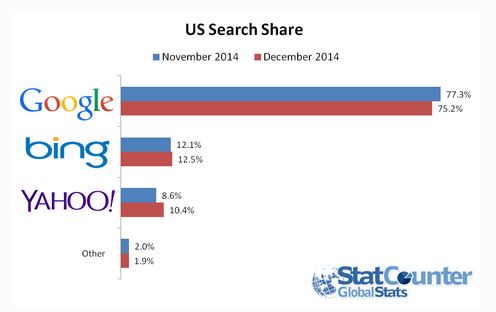A recent report from StatCounter about U.S. search share suggests Google is losing its dominance. At the end of 2014, Yahoo grabbed nearly 2 percent of searches at Google’s expense, bringing its search share above 10 percent for the first time since 2009.
This is big news for Yahoo, which has been trailing Google in terms of search share (but not always visits to owned pages – Yahoo actually overtook Google in property visits July 2013).
The sudden surge in searches is largely owed to Yahoo’s recent partnership with Mozilla. The search browser ended its 10-year deal with Google, and now defaults to Yahoo when users enter queries.
What does Yahoo’s search uptick mean for SEO strategies?
On one hand, not much. While independently impactful, Yahoo’s 10.4 percent search share doesn’t quite stack up to Google’s 75 percent. Therefore, marketers are wise to continue on the same course of action – optimizing web content for Google’s algorithms and Quality guidelines.
On the other hand, it could suggest a sweeping change in the SEO world that forces brands to think beyond Google for web marketing strategies. As it stands now, Yahoo and Bing together account for about 22 percent of all searches. So they are eating into Google’s lead.
Optimizing web content in a post-Google search landscape
An SEO landscape that Google doesn’t define might seem hard to imagine at present, but marketers shouldn’t be surprised when it arrives. Web users are fickle, and what’s popular one year could very well become obsolete the next.
However, a good search strategy shouldn’t be contingent on Google – or any search engine – for success. Marketers should be creating high-quality web content that users are searching for, and optimized so it’s easy to find. A strategy that’s too focused on a search company’s algorithms and rules will eventually take a hit, because the engines themselves evolve to serve better answers over time – and no longer reward pages that are over-optimized for old criteria.
The moral of the story is: Companies that want search visibility and traffic need to produce valuable content that will rank well on any search site or social network. Diverse web marketing strategies will build a brand presence across the web that stays solvent even if Google maintains its search monopoly or eventually topples.
For more insights on how to create content to rank well in today’s search environment, download Brafton’s Content for SEO eBook.





